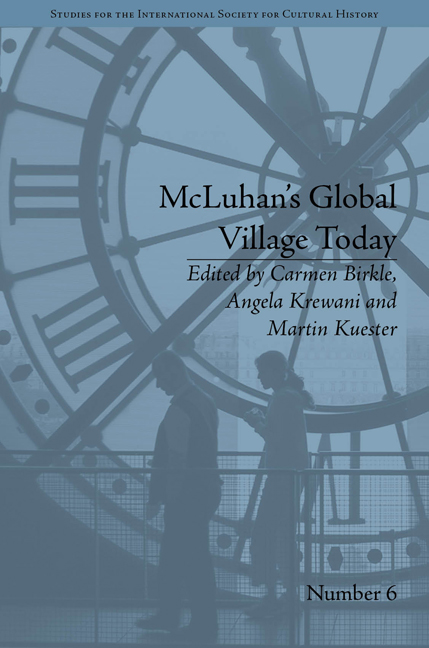Book contents
- Frontmatter
- CONTENTS
- List of Contributors
- List of Figures
- McLuhan's Global Village Today: An Introduction
- Part I McLuhan and Media Theory
- 1 In-Corporating the Global Village
- 2 Metaphorical Effects: McLuhan's Media
- 3 Hot/Cool vs Technological/Symbolic: McLuhan and Kittler
- 4 Global Immediacy
- 5 The Complementary Aspects of Marshall McLuhan and Postmodernism in the Literary Study of the Internet: Exemplified in the Rhizome Theory of Gilles Deleuze and Félix Guattari
- 6 Dubjection: A Node (Reflections on Web-Conferencing, McLuhan and Intellectual Property)
- Part II McLuhan and Literature
- Part III McLuhan and Technical Media
- Notes
- Index
5 - The Complementary Aspects of Marshall McLuhan and Postmodernism in the Literary Study of the Internet: Exemplified in the Rhizome Theory of Gilles Deleuze and Félix Guattari
from Part I - McLuhan and Media Theory
- Frontmatter
- CONTENTS
- List of Contributors
- List of Figures
- McLuhan's Global Village Today: An Introduction
- Part I McLuhan and Media Theory
- 1 In-Corporating the Global Village
- 2 Metaphorical Effects: McLuhan's Media
- 3 Hot/Cool vs Technological/Symbolic: McLuhan and Kittler
- 4 Global Immediacy
- 5 The Complementary Aspects of Marshall McLuhan and Postmodernism in the Literary Study of the Internet: Exemplified in the Rhizome Theory of Gilles Deleuze and Félix Guattari
- 6 Dubjection: A Node (Reflections on Web-Conferencing, McLuhan and Intellectual Property)
- Part II McLuhan and Literature
- Part III McLuhan and Technical Media
- Notes
- Index
Summary
Introduction
The following text on McLuhan, Deleuze and Guattari, as a possible foil for convergences and complementarities of a North American and a European theory complex, contains new combinations and references from both theories. It focuses on a close reading of the primary texts concerning the abstract ‘model’ of interrelations itself. The present essay – which is divided into three sections – is kept as abstract as possible. The discipline aimed at is literary form and content analysis especially of hypermedia productions in their relation to a social theory of communication, the general theory of social systems or neocybernetics. This abstract focus should help analysing as well as revealing structural possibilities and limits of hypermedia productions in general, whether fictional (hyperfictions) or non-fictional (for example journalistic or public relations productions).
Many hypermedia theorists in European literary studies refer to postmodern or poststructuralist predecessors, whereas Marshall McLuhan's theories of the changes of cognition and cultural production by dominant media technologies are often neglected due to being ‘outdated’ (referring to television and cybernetic theories of the 1960s) or ‘hierarchical’ (in his alleged dominant Catholicism). I will not discuss the reasons for this here but refer to several relevant statements in more recent books on McLuhan. McLuhan elaborated his enigmatic and oft en misunderstood statement that ‘the medium is the message’ in the 1960s and 1970s into an extensive theorem of an ever-changing, flux- or field-like process and hybridization of humans and technologies (‘embodiment’) that he finally called ‘the global village’.
- Type
- Chapter
- Information
- McLuhan's Global Village TodayTransatlantic Perspectives, pp. 47 - 58Publisher: Pickering & ChattoFirst published in: 2014



